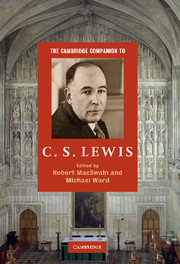20 - Till We Have Faces
from Part III - Writer
Published online by Cambridge University Press: 28 November 2010
Summary
Till We Have Faces: A Myth Retold (1956) was C.S. Lewis's last work of fiction, and the one he considered his best. He was disappointed by the initial response to it: some reviews were partially negative and sales were lower than his other books, probably because of its difficulty and its differences from his earlier fiction. It remains the least popular of his fictional works, though it is the most highly praised by literary critics. / Background / The book is a retelling of the Cupid and Psyche myth, from the Metamorphoses, or The Golden Ass, of Lucius Apuleius. Lewis first read the tale in late 1916, and responded by trying to write his own version of it. A diary entry for May 1922 records, 'Tried to work on “Psyche” . . . with no success' and in November of that year he was 'thinking how to make a masque or play of Psyche'. A year later his 'head was very full of my old idea of a poem on my own version of the Cupid and Psyche story'; he had by this point already started such a poem twice, 'once in couplet and once in ballad form'. The story stayed in Lewis's mind, 'thickening and hardening with the years', but if he made other attempts to tell it in poetic form, nothing is known of them. He returned to it in March 1955, when Joy Davidman Gresham (the woman he was to marry the following year) spent a weekend with Lewis and his brother.
- Type
- Chapter
- Information
- The Cambridge Companion to C. S. Lewis , pp. 281 - 293Publisher: Cambridge University PressPrint publication year: 2010
- 3
- Cited by



